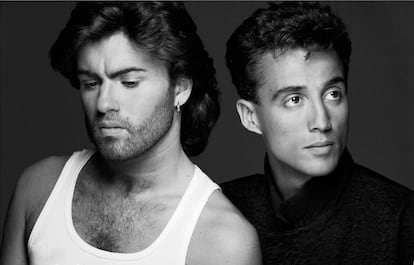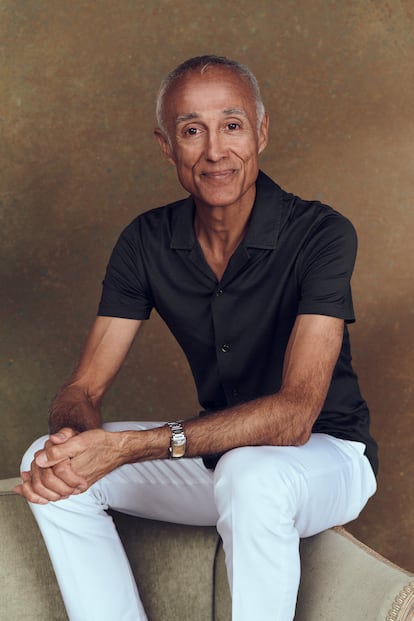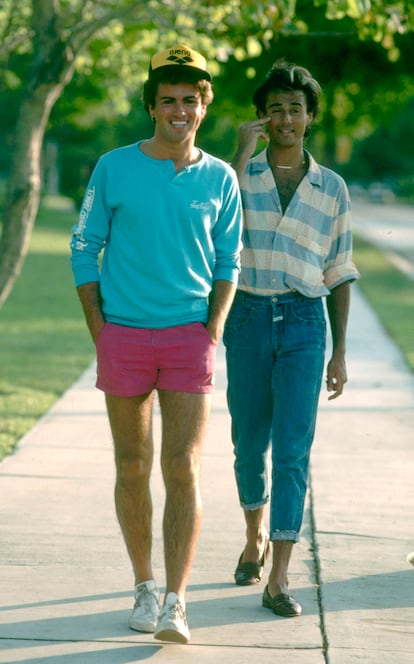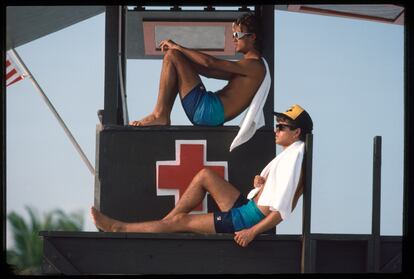Wham!’s Andrew Ridgeley: ‘George Michael thought it might hurt us if he came out as gay and I encouraged him not to say anything’
A captivating Netflix documentary and lavish greatest hits compilation resurrect the triumphant but ephemeral 1980s duo that launched one member into superstardom and another who faded into obscurity

Wham! was one of the most successful groups of the 1980s when the duo broke up after their last concert at London’s Wembley Stadium on June 28, 1986. The two Brits had sold 28 million records worldwide in less than a decade, and were still in their early twenties. The better-known George Michael then launched a solo career and became one of the biggest-selling and most influential artists in contemporary pop music. But the other half of the duo – Andrew Ridgeley – faded into obscurity and his name morphed into a poignant emblem of failure. Perhaps worse, he was seen as lacking drive and ambition, silently acquiescing to his partner’s towering accomplishments.
Ridgeley seems to have inspired a recurring theme of ridicule in pop culture. In Music and Lyrics (2007), a romcom starring Hugh Grant and Drew Barrymore, Grant plays a washed-up former pop star from the fictional British group ‘PoP!, clearly evoking the other guy from Wham! The indie group Black Box Recorder’s song Andrew Ridgeley seemingly expressed support for him, although the sincerity or irony behind the message remains unclear. Seven years have passed since the heartbreaking loss of George Michael on Christmas Day 2016, when he succumbed to a heart attack. Andrew Ridgeley stands as the sole surviving member of the group, entrusted with preserving and honoring their musical legacy. In fact, since 1986, Ridgeley has primarily relied on that as his main source of income. He still pulls in a steady stream of royalties every year as the co-author of hits like Careless Whisper and Club Tropicana. Who’s the loser now?
More is coming Ridgeley’s way with the July 7 release of The Singles: Echoes From The Edge Of Heaven, a greatest hits compilation with special editions that include a hardcover book with notes on each single and a cassette of bonus mixes. And don’t miss out on the July 5 premiere of the Netflix documentary Wham!, which delves into the duo’s extraordinary journey.

Question: You will go down in pop history as the other guy from Wham!, but I think you were comfortable with your place in the duo. Did you ever feel bothered that he was more popular?
Answer: I could never be jealous of my best friend. I was incredibly proud of how George had developed his talent as a songwriter and how he kept improving, with constant leaps in quality. It was amazing to be right there with him, part of it all. So, I never saw it as something negative. All we really wanted was to have a band, you know? When I made that call to the first record executive, can you believe I was only 16? All I wanted was to write and perform songs, and we got the chance to go into a studio and record. But honestly, I never had any other ambitions, at least not like George did. He really wanted to compose songs that expressed what he held inside. That just wasn’t me. I was happy just being part of the band and hitting the road for tours.
Q: The documentary is mostly a story about your friendship, but you both realized that Wham! was a celebration of youth, and was never intended to reach middle age.
A: Yeah, that’s absolutely true! Wham! was like this magical expression of our friendship, you know? We were in school and decided to start a band together, writing songs as a duo. Those songs really captured what we were going through, our bond, and our unique style, which we got from our wild nights out dancing at clubs. Everything about Wham! was shaped by our friendship and the situations we found ourselves in.
Q: In those five years, George and you were practically life partners. Did you feel any emptiness going home after the last concert for 70,000 people at Wembley, knowing that it was all over?
A: My experience in Wham! was always positive. We had talked about putting on that concert at Wembley for months, but I can’t quite remember when we decided it would be the last. Even before that, we knew George had bigger artistic ambitions and that the group had been holding him back in a way. But we understood, we were okay with it. We had achieved so much more than we ever dreamed of. The concert was a massive success, not just in terms of numbers, but it also had a special place in the hearts of so many people.

Q: In the documentary, George is depicted as this tortured character who had a complex relationship with popularity and everyday life. But you seemed to handle it all with ease and actually enjoyed the whole experience. Was it really like that?
A: George made sure to keep his private life completely separate from the public eye, from the press and all that. It didn’t really bother me much, but it was kind of annoying when I had a famous girlfriend [Keren Woodward from Bananarama; Ridgeley’s wife for 27 years]. The media just became so intrusive and totally inappropriate. I mean, growing up, my family never cared about all that celebrity stuff, so it really caught me off guard.
Q: In 1983, while filming the Club Tropicana video in Ibiza, George told you he was gay. Was there any pressure from the industry to hide the truth because it would be detrimental to your career?
A: George actually thought it might hurt Wham! if he did that. We were so young back then, and both Shirlee [Holliman, the band’s backing singer] and I encouraged him not to say anything. On one hand, we knew there was nothing wrong with it, but I also knew his father wouldn’t react well. Our advice to George was simple – don’t tell your parents. I don’t think it really had much to do with what was happening in the industry. Boy George was already out there, and even though his image was kind of asexual, everyone knew he was gay. There were bands like Bronski Beat and artists like Elton John who didn’t go public about their sexuality until the mid-80s, I think. And Freddie [Mercury], well, he never explicitly announced it, but everyone knew he was gay. Who knows if things would’ve turned out differently? It’s something we’ll never know. I do know that although George ended up facing the consequences of that decision, it didn’t affect his creativity.
Q: Your most popular song is probably “Last Christmas”, but “Do They Know It’s Christmas?” [the charity song to raise money for the 1983–1985 famine in Ethiopia] prevented it from reaching number one in the UK. The irony was that George also sang on that song.
A: “Last Christmas” has become one of those great Christmas classics that everyone loves. I don’t know if it’s more remembered than Careless Whisper, but they both have that element of lost love. George was such an amazing lyricist, and we really tried to give the song that perfect Christmas vibe. It’s just so well-crafted. It should have been number one in Christmas 1984, but it finally got its due in 2020.

Q: In 1985, Wham! was the first Western group to perform in China. What was that like?
A: Our experience was... well, let’s just say it was a bit limited. We had all these restrictions on what we could and couldn’t do. Our schedule was jam-packed, so it didn’t exactly feel like a vacation [laughs]. But what we saw of the country definitely lived up to our expectations. Overall, it was a pretty interesting experience, and I actually enjoyed some bits of it.
Q: During that trip, cult filmmaker Lindsay Anderson [director of If...] was going to film an official documentary about the tour but was removed from the project. What happened?
A: When they suggested Lindsay Anderson as the director, I wasn’t really on board. We were hoping for a more optimistic and fun vibe, but Lindsay had a different perspective. I thought everyone could see that, but George and some of the team thought Lindsay would bring credibility and seriousness to the project… but here’s the kicker – we weren’t a super serious band! Lindsay was just not the right fit. I would’ve bet my house that it wouldn’t work out and it didn’t. It was one of those rare wrong decisions by George [laughs].
Q: After Wham! broke up, you recorded a solo album in 1990 – Son of Albert – that was poorly received by critics, the public and your own record label. Did that hurt?
A: I think it was a poorly conceived project. I just wanted to release a single and test the waters, but the record label suddenly wanted an album. It took me 18 months to compose and record it. If I could go back in time and give myself some advice, I would have definitively nixed the idea of writing songs in a different genre – it was very rock & roll.
Q: After that, you practically retired completely.
I wasn’t looking for fame or headlines, I was just doing what I was doing. My attention simply shifted elsewhere.
Sign up for our weekly newsletter to get more English-language news coverage from EL PAÍS USA Edition
Tu suscripción se está usando en otro dispositivo
¿Quieres añadir otro usuario a tu suscripción?
Si continúas leyendo en este dispositivo, no se podrá leer en el otro.
FlechaTu suscripción se está usando en otro dispositivo y solo puedes acceder a EL PAÍS desde un dispositivo a la vez.
Si quieres compartir tu cuenta, cambia tu suscripción a la modalidad Premium, así podrás añadir otro usuario. Cada uno accederá con su propia cuenta de email, lo que os permitirá personalizar vuestra experiencia en EL PAÍS.
¿Tienes una suscripción de empresa? Accede aquí para contratar más cuentas.
En el caso de no saber quién está usando tu cuenta, te recomendamos cambiar tu contraseña aquí.
Si decides continuar compartiendo tu cuenta, este mensaje se mostrará en tu dispositivo y en el de la otra persona que está usando tu cuenta de forma indefinida, afectando a tu experiencia de lectura. Puedes consultar aquí los términos y condiciones de la suscripción digital.








































